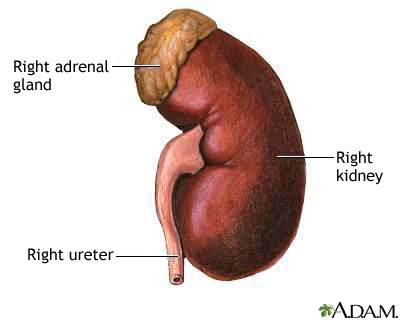Source(google.com.pk)
Kidney Biography
Chronic kidney disease is a general term for heterogeneous disorders affecting kidney structure and function. The 2002 guidelines for definition and classification of this disease represented an important shift towards its recognition as a worldwide public health problem that should be managed in its early stages by general internists. Disease and management are classified according to stages of disease severity, which are assessed from glomerular filtration rate (GFR) and albuminuria, and clinical diagnosis (cause and pathology). Chronic kidney disease can be detected with routine laboratory tests, and some treatments can prevent development and slow disease progression, reduce complications of decreased GFR and risk of cardiovascular disease, and improve survival and quality of life. In this Seminar we discuss disease burden, recommendations for assessment and management, and future challenges. We emphasise clinical practice guidelines, clinical trials, and areas of uncertainty.
Screening (looking) for early kidney disease in people who are not already known to have it. Kidney disease is common and is commonly insidious in onset. The burden of kidney disease in its earlier stages lies not only in the risk of progression but in the complications of decreased kidney function and the risk of heart disease.
In 2002 the National Kidney Foundation (NKF) set forth guidelines for kidney disease screening. It recommended that all individuals at increased risk for chronic kidney disease have their blood pressure measured and their blood and urine tested for signs of impaired kidney function. Those at increased risk for chronic kidney disease were defined as people with:











Kidney Biography
Chronic kidney disease is a general term for heterogeneous disorders affecting kidney structure and function. The 2002 guidelines for definition and classification of this disease represented an important shift towards its recognition as a worldwide public health problem that should be managed in its early stages by general internists. Disease and management are classified according to stages of disease severity, which are assessed from glomerular filtration rate (GFR) and albuminuria, and clinical diagnosis (cause and pathology). Chronic kidney disease can be detected with routine laboratory tests, and some treatments can prevent development and slow disease progression, reduce complications of decreased GFR and risk of cardiovascular disease, and improve survival and quality of life. In this Seminar we discuss disease burden, recommendations for assessment and management, and future challenges. We emphasise clinical practice guidelines, clinical trials, and areas of uncertainty.
Screening (looking) for early kidney disease in people who are not already known to have it. Kidney disease is common and is commonly insidious in onset. The burden of kidney disease in its earlier stages lies not only in the risk of progression but in the complications of decreased kidney function and the risk of heart disease.
In 2002 the National Kidney Foundation (NKF) set forth guidelines for kidney disease screening. It recommended that all individuals at increased risk for chronic kidney disease have their blood pressure measured and their blood and urine tested for signs of impaired kidney function. Those at increased risk for chronic kidney disease were defined as people with:
Kidney
Kidney

Kidney

Kidney
Kidney
Kidney
Kidney

Kidney
Kidney
Kidney
Kidney

Kidney
No comments:
Post a Comment